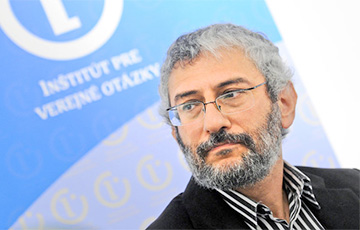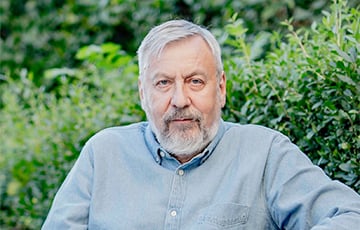Brussels, Moscow and European Belarus
- Grigory Mesezhnikov
- 12.05.2016, 13:39
- 4,138

PHOTO: AKTUALITY
Current relationships between the EU and Belarus are similar to a tangle, made of the threads of different properties: color, toughness and length.
Let us try to unwind some of them in order to understand better, how these relations have been developing and what is happening right now.
The EU and Central Europe: the first and second echelons
The EU has emerged as a community of nations, united by the common values (social, political, cultural, spiritual), elaborated in Europe during its preceding development. Today's Europe is a cherished goal for millions of people living in different corners of the globe. The EU as an organization embodies the desire for unity of Europe, and there are still the continent's countries seeking to join this community. Belarus, a country with European cultural and civilizational code relied on the legacy of ancient and recent national history, is in the immediate neighborhood of the European Union, is drawn to a united Europe and sees its future in the family of the European nations.
For decades, the European Union, pursuing a policy towards neighboring countries, has been modifying this policy according to the circumstances and at the same time has been trying to take into account the basic characteristics of this valuable luggage.
In the early 90’s, the neighbors of the European Union, the former Soviet bloc, began to knock at its door wishing to enter this common European home. This knock was growing louder and stronger, it became impossible not to hear it, and, after the initial uncertainty, the European Union determined its position: the doors will open, but on the condition that the knocking countries fulfill several requirements. After that, they will remain in the common European home forever. As a result, in 2004 – 2014, the EU has expanded – it accepted into its ranks eleven post-communist countries that were a part of the first echelon – the closest neighborhoods of the EU. After the Central European neighbors of the EU have become its full members, Belarus has appeared in the immediate vicinity of the united Europe.
Its status, however, was different from the status of the associated states that have achieved full membership: Visegrad countries, Baltic States, Slovenia, Bulgaria, Romania and Croatia. At that time when the most of the Central European countries began joining the European Union, Belarus, being in the second echelon among the states that in one way or another interact with the European Union, came under the European Neighborhood Policy (ENP).
European Neighbourhood Policy and the Eastern Partnership: lost chance for Belarus
Although the inclusion of the state into the ENP did not give a direct membership perspective, it offered great opportunities to establish the long-term partnership. Close cooperation with the EU enabled a neighbouring state to carry out internal changes in order to become more consistent with the parameters of the model of liberal-democratic regime with developed market economy. This has been a special feature of cooperation with this integration union as opposed to the cooperation with other international organizations.
The European Union launched ENP in 2004, and, in 2009, strengthened its eastern direction through a special program of the Eastern Partnership (EaP). Belarus, however, was excluded from the implementation of the ENP and EaP due to its internal problems - primarily due to non-compliance of the basic characteristics of the political regime to the norms and principles of democracy.
In other words, because of the authoritarian state power that systematically violates rights and freedom of citizens, imprisons political opponents, manipulates election results and suppresses democracy, the Belarusian population lost the possibility to take full advantage of what the united Europe offered to its neighbouring partners in many areas, such as reformations and social innovations, which could significantly help Belarus to improve its citizens’ quality of life and modernize Belarusian society.
Lukashenko’s "European" game and the suspension of sanctions
Under these conditions, the Belarusian authoritarian leader, Alexander Lukashenko, started playing the game, the purpose of which was to show a more friendly, "pro-European", "pro-Western" face and to create the impression that he sought out the path towards Europe, not Russia. Although the European Union has not completely dropped off the so-called Russian dimension of its relations with Belarus that Alexander Lukashenko shamelessly interwove in his European policy, the key to the EU-Belarusian relationship was only what was actually happening in Belarus.
In this regard, the European Union for a long time did not abandon its main path, based on the system of democratic norms and principles. The EU tried to improve relations with Belarus (or possible removal of sanctions imposed in response to the violation of human rights) by the positive internal changes, rejection of political repressions, creation of more favourable conditions for pluralism and free expression of citizens in the elections.
After the presidential elections of 2010 and brutal repressions against members of the opposition and protesting citizens, relations between the EU and Belarus reached the freezing point. The European Union imposed sanctions on specific individuals and restrictions in mutual trade. Relations, in fact, remained to be in such a frozen state until the beginning of 2016.
In February 2016, the EU decided to temporarily suspend most of the imposed sanctions. As a Lukashenko’s step in the right direction, the EU took the decision to release members of the opposition from prisons in August 2015 (some of them had been in prison since 2010). This hopeful event, however, was not backed up by subsequent changes for the better, despite the fact that such opportunities were provided to the regime, in particular, during the presidential elections in October 2015. OSCE observers fixed that those elections were competitive and alternative only on paper and the election process did not meet the criteria of free and fair elections. Released opposition leaders have not been fully exonerated; their rights continue to be infringed and some of them are forced to hide from persecution abroad.
The EU's decision to suspend sanctions against Belarus was viewed somewhat ambiguously. Official Minsk, understandably, welcomed the suspension. Opposition and democracy activists were disappointed, and they did not agree with its reasoning. Indeed, Brussels approach (particularly, its inspection) to the very formulation of sanctions’ introduction and lifting is quite puzzling. As it is well known, the meaning of the sanctions was to ensure improvement of the situation concerning human rights in Belarus. Cancellation or suspension of sanctions should have been based on the concrete evidence of improvements based on the facts. Such evidence was not presented, and everyone, who is at least slightly familiar with the situation in Belarus, understands that it simply could not be presented at all.
Is Kremlin showing up on the horizon again?
At the same time, the EU has some considerations about the need to maintain the existing level of regional stability and to prevent Minsk from falling into Moscow's embrace. Although these considerations, taken individually, sound quite reasonable, they are inadequate and non-suitable in the current environment. These considerations suggest that the adoption of important decisions by the EU has been impacted by the factor that has nothing to do with the essence of relations between Brussels and Minsk.
In that connection, the question arises. Let us assume that in the near future there will be positive developments in the internal development of Belarus that will bring major changes for the better: democracy will be restored, all political forces will have equal opportunities for their activities, human rights will be strictly adhered to. Consequently, there will appear conditions for the active involvement of the country in the EaP program, with the possibility of signing the Association Agreement and the prospect of gradual entry of Belarus into the European Union. It is clear that Brussels would only welcome such a development. Where, however, will be the line preventing decisions related exclusively to Belarus from being influenced by the considerations about the relationship of the European Union and Belarus with another State (in this case with Russia)?
Under the current leadership, Russia is doing everything possible to slow down and, if possible, to prevent the movement of the former Soviet republics to Europe and to the West. The war against the Ukraine (and before that - against Georgia) and open pressure on Moldova and Armenia visually confirm that. There is no reason to assume that the Russian position will change when it comes to Belarus. Quite the contrary - if the current Kremlin leadership continues to be in power, even tougher approach is possible on its part.
Belarus should determine the future of Belarus
Many European politicians have been repeatedly stating that Russia does not have the right to determine which international organizations independent states may join. It is the exclusive right of the peoples of these states and no one else. The EU should not (and simply has no moral right) to deviate from this principle. However, the European Union cannot afford to be involved in this game, played out by the authoritarian Belarusian leader seeking to achieve a change in Europe's attitude towards his regime. Unfortunately, the suspension of EU sanctions - without visible changes in Belarus on the background of concerns about alleged strengthening of relations between Minsk and Moscow in case of sanctions abandonment - shows the opposite.
The fate of democracy in Belarus and its European future are in the hands of the citizens of this country. The task of the European Union is to do everything in its power to make this future come as soon as possible, so that democracy and European path are not obstructed by internal or external enemies that clearly act today with the same purpose.
Grigory Mesezhnikov, the director of the Slovakia-based Institute for Public Affairs, specially for charter97.org










